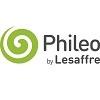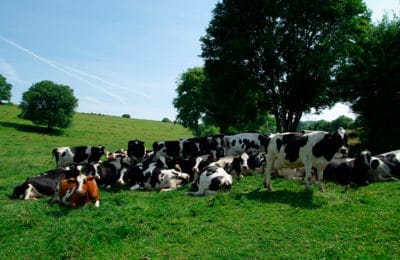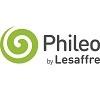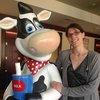
Content sponsored by:
Phileo by Lesaffre
Top yielding dairy cows are feeling the heat
Published: April 17, 2020
Source : Phileo by Lesaffre

High performing dairy cows appear to be more susceptible to the damaging effects of heat stress than lower yielding stock.
Although the combination of rising temperatures and high levels of humidity is a major challenge for all milking cows, those at the top of the production league appear to be most at risk of significant milk yield reduction and subsequent health issues, according to a detailed review of current research data carried out by Phileo Lesaffre Animal Care, France.
To quantify high risk periods of heat stress in dairy livestock, specialists use the temperature humidity index (THI) to measure the combined effect of ambient temperature and relative humidity (RH) and calculate a cow’s heat load intensity.
In this context, it was previously thought that the lowest threshold point at which cows would suffer heat stress was THI 72, a rating which covers a temperature range of 23.9 °C to 32.2 °C and an RH of 65% to zero.
Now, with milk production per cow continuing to increase, the lowest threshold point has shifted to THI 68, covering a temperature range from 22.2 °C to 26.7 °C and an RH from 45% to zero.
“Understanding these changing heat stress trigger points is crucial for preserving milk performance, in the short term, and stock health, in the long term,” said Christine Julien, Phileo’s Ruminant R&D Manager.
While at 22 °C and RH 10% (THI 65) most cows will show no stress signs at all, a shift in conditions to 27 °C and RH 35% (THI 73) will result in the animal’s respiratory rate doubling to 75 pants per minute.
Cows are also likely to stand much more than normal in such conditions in an attempt to cool themselves, basically by increasing their exposure to all available air flows.
By the time THI reaches 90 (39°C and RH 50%) the respiratory rate could be as high as 140/min with the cow having a rectal temperature of up to 41°C.
“The knock-on effects of this can be devastating with heat stressed cows eating less and standing more,” said Dr. Julien. “These are both major contributory factors to the development of a negative energy balance in affected cows, resulting in an inevitable and relatively rapid fall in milk yield.
“This immediate impact leads into longer term issues, such as rising rumen acidosis, which is caused by a number of factors.
“The condition is often triggered by reduced feed intake and the impact of subsequent diet adjustments made in an attempt to retain energy levels in affected cows. Such actions need to be handled with care as the combination of a ‘hotter’ ration and the cows reduced ability to neutralise the rumen contents, directly increases the risks of rumen acidosis.
“Changes in the cow’s natural eating behaviour, such as feeding less frequently than normal, can also contribute to rumen acidosis, especially when decreased frequency is accompanied by larger meals and more acid-producing post-eating.
“Cows also typically over-eat the day following a heat wave, which is another well-known cause of rumen acidosis.”
To help farmers’ mimimise such problems, Phileo has developed and tested a range of yeast-based solutions which are designed to enhance rumen efficiency, raise immunity levels and boost the animal’s immune competency.
Starting with the company’s yeast probiotic Actisaf®, trial results show that mid-range producing dairy cows, faced with heat stress conditions THI 68-72, produced 5% more milk and milk solids on the treatment than cows in a control group.
In trials with higher producing dairy cows, faced with even more intense heat stress (THI 69-79), feeding Actisaf® delivered 2.5% better intake and 3.7% better feed efficiency, both in comparison to control cows. As a result, milk yield was 4% better than the control with milk fat showing a 10% advantage.
Trials with Phileo’s premium yeast parietal fraction, Safmannan®, used to address immunity issues, showed the product to be effective in triggering a positive immune response. It also helped alleviate a rise in somatic cell count (SCC), which is another standard consequence of heat stress.
Selsaf®, the company’s selenium-enriched yeast product, tested as a modulator of the negative impacts of heat stress, also showed beneficial results in relation to SCC, alongside helping to maintain better mammary health in treated cows than in a control group.
Phileo’s conclusion is that all three products offer farmers additional “promising solutions” for use in alleviating the effects of heat stress in dairy cows.
Source
Phileo by LesaffreRelated topics:
Mentioned in this news release:

Recommend
Comment
Share

Would you like to discuss another topic? Create a new post to engage with experts in the community.


